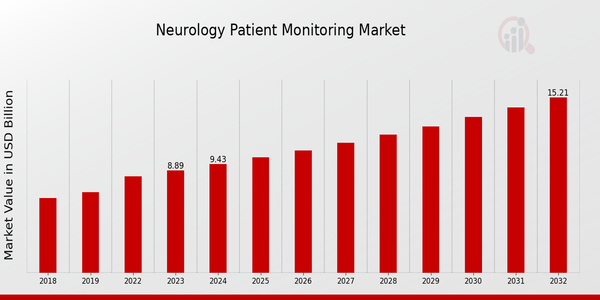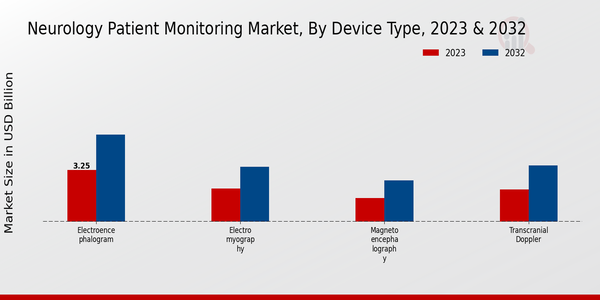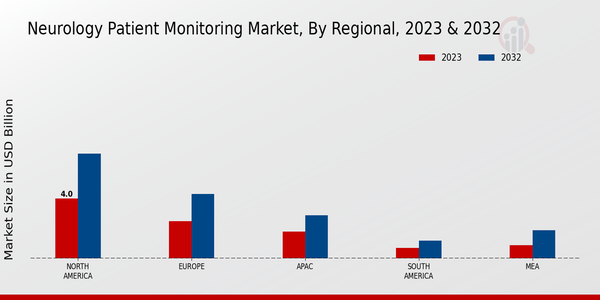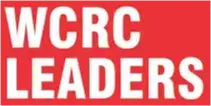Neurology Patient Monitoring Market Overview
As per MRFR analysis, the Neurology Patient Monitoring Market Size was estimated at 10.01 (USD Billion) in 2024. The Neurology Patient Monitoring Market Industry is expected to grow from 10.63 (USD Billion) in 2025 to 18.19 (USD Billion) till 2034, at a CAGR (growth rate) is expected to be around 6.15% during the forecast period (2025 - 2034).
Key Neurology Patient Monitoring Market Trends Highlighted
The Global Neurology Patient Monitoring Market is experiencing notable growth driven by the increasing prevalence of neurological disorders such as epilepsy, Alzheimer's, and Parkinson's disease. This rise in incidence is prompting greater demand for advanced monitoring solutions that can provide real-time data for the effective management of these conditions. Additionally, technological advancements in remote monitoring devices and telemedicine are shaping the market landscape, enabling better patient engagement and improved healthcare outcomes. The aging population, which is more susceptible to neurological diseases, further amplifies the need for reliable monitoring solutions. An abundance of opportunities lies within the development of innovative monitoring technologies, particularly those that employ artificial intelligence and machine learning to enhance diagnostic accuracy and treatment personalization. The integration of wearable devices for continuous monitoring and data collection allows for proactive management of neurological conditions and increases the potential for timely interventions. Furthermore, the expansion of healthcare infrastructure in emerging markets offers new avenues for market participants to introduce their solutions, catering to a growing patient population that seeks reliable monitoring options for neurological ailments.
Recent trends indicate a shift toward more patient-centered approaches that focus on individualized care plans. The increased collaboration between healthcare providers and technology companies has led to the creation of more sophisticated and user-friendly monitoring devices. As awareness of mental health issues continues to rise, there is a greater emphasis on holistic monitoring solutions that cater to both physical and psychological aspects of patient care. This evolving landscape presents a clear direction for stakeholders aiming to capitalize on opportunities within the neurology patient monitoring sector, paving the way for advancements that can improve the quality of life for affected individuals.

Source: Primary Research, Secondary Research, MRFR Database and Analyst Review
Neurology Patient Monitoring Market Drivers
Increasing Prevalence of Neurological Disorders
The Global Neurology Patient Monitoring Market Industry is witnessing robust growth propelled by the escalating prevalence of neurological disorders such as epilepsy, Alzheimer's disease, Parkinson's disease, and stroke. With an increasing aging population globally, the incidence of these disorders is anticipated to rise significantly. As the number of patients suffering from chronic neurological conditions escalates, there is a pressing need for advanced monitoring solutions capable of providing real-time data on patients' neurological health.This scenario spurs demand for innovative patient monitoring technologies that facilitate early diagnosis and continuous monitoring of neurological symptoms. Furthermore, with advancements in healthcare technology focused on diagnostics and treatment, healthcare providers are increasingly incorporating patient monitoring devices and systems into their workflows. This integration ensures timely interventions, which can lead to improved patient outcomes and reduced healthcare costs.As healthcare systems and professionals strive to enhance the quality of care and optimize resource allocation, technologies that enable comprehensive tracking of neurological conditions and treatment responses become indispensable. Consequently, the Global Neurology Patient Monitoring Market industry is anticipated to expand significantly in the coming years, driven by the urgent need to address the growing burden of neurological diseases and ensure better management and patient engagement.
Technological Advancements in Monitoring Devices
Rapid advancements in medical technology are significantly contributing to the growth of the Global Neurology Patient Monitoring Market industry. Innovations such as wearable devices, mobile health applications, and remote monitoring systems enhance the ability to monitor patients' neurological conditions more effectively and efficiently. These devices not only allow healthcare providers to obtain crucial health data in real time but also empower patients to manage their conditions actively.
Rising Awareness and Acceptance of Telehealth
The growing acceptance of telehealth services is another critical driver of the Global Neurology Patient Monitoring Market industry. The COVID-19 pandemic has accelerated the adoption of telehealth, enabling patients to receive care from their homes without compromising the quality of treatment. Telehealth technologies facilitate remote consultations, virtual follow-ups, and continuous patient monitoring, which are particularly beneficial for those with chronic neurological conditions.As stakeholders in the healthcare ecosystem recognize the advantages of telehealth in terms of accessibility, convenience, and reduced costs, the demand for neurology patient monitoring solutions integrated with telehealth capabilities is expected to increase significantly.
Neurology Patient Monitoring Market Segment Insights
Neurology Patient Monitoring Market Device Type Insights
The Global Neurology Patient Monitoring Market, categorized by Device Type, is experiencing a notable expansion in its valuation and significance. As of 2023, this market segment reported a total revenue of 8.89 USD Billion, indicating a competitive landscape characterized by several key devices.
Within this sector, the Electroencephalogram (EEG) stands out prominently, generating a significant value of 3.25 USD Billion. This device is crucial for monitoring electrical activity in the brain, making it indispensable in diagnosing conditions such as epilepsy, sleep disorders, and other neurological conditions, which explains its dominant position in the market.Following closely is the Electromyography (EMG), valued at 2.1 USD Billion. The EMG's role in assessing the health of muscles and the nerve cells that control them is vital for diagnosing conditions such as muscular dystrophy and neuropathy, showcasing its relevance to patient monitoring.
The Magnetoencephalography (MEG) market sees a valuation of 1.5 USD Billion, providing critical insights into brain activity with non-invasive monitoring techniques, crucial for research and clinical applications in neurology, thus maintaining its significance albeit as a smaller segment.Additionally, the Transcranial Doppler, valued at 2.04 USD Billion, plays a pivotal role in assessing cerebral blood flow, making it essential in stroke diagnosis and other acute neurological conditions.
Each of these devices contributes uniquely to the Global Neurology Patient Monitoring Market segmentation, reflecting a diverse range of applications and driving factors. The collective growth within these device types is supported by increasing awareness regarding neurological disorders, growing aging populations, and enhancements in technology enabling better patient outcomes.

Source: Primary Research, Secondary Research, MRFR Database and Analyst Review
Neurology Patient Monitoring Market Monitoring Type Insights
The Global Neurology Patient Monitoring Market is poised for growth, with a market value of 8.89 USD Billion in 2023. The segmentation based on Monitoring Type plays a crucial role in addressing diverse patient needs. Invasive Monitoring and Non-invasive Monitoring are two key classifications within this segment. The significance of Invasive Monitoring lies in its ability to provide precise and real-time data, which is essential for critical neurological assessments and management.
Conversely, Non-invasive Monitoring is gaining traction due to its patient comfort and reduced risk, making it a preferred choice in many clinical settings.This balanced approach between the two monitoring types is driving innovation and expanding the overall market landscape. Trends indicate an increasing preference for advanced technology integration and digital solutions, which further propels the Global Neurology Patient Monitoring Market.
Challenges such as high costs associated with certain monitoring devices and potential regulatory hurdles remain, yet the growing prevalence of neurological disorders presents substantial opportunities for market expansion and development.
Overall, the continued evolution of the Global Neurology Patient Monitoring Market is expected to redefine standards of care and enhance patient outcomes significantly.
Neurology Patient Monitoring Market Application Insights
The Global Neurology Patient Monitoring Market, valued at 8.89 USD Billion in 2023, is experiencing substantial growth driven by the increasing prevalence of neurological disorders. This segment encompasses various applications, including Epilepsy Monitoring, Stroke Monitoring, Sleep Disorder Monitoring, and Neurodegenerative Diseases Monitoring, each playing a vital role in patient care.
Epilepsy Monitoring holds a significant share, essential for identifying seizure patterns and optimizing treatment approaches. Stroke Monitoring is crucial as early detection and intervention greatly improve patient outcomes, reflecting its importance in emergency healthcare settings.Sleep Disorder Monitoring has gained traction due to the rising awareness of sleep-related issues, which affect millions globally. Neurodegenerative disease monitoring is critical as it allows for ongoing assessment and tailored treatment strategies for diseases such as Alzheimer's and Parkinson's.
The market growth is fueled by technological advancements and an increasing focus on personalized medicine. However, challenges such as high costs of monitoring devices and concerns over data privacy remain prevalent. Overall, the diverse applications within the Global Neurology Patient Monitoring Market highlight significant opportunities for growth and innovation in addressing the complexities of neurological care.
Neurology Patient Monitoring Market End-Use Insights
The Global Neurology Patient Monitoring Market is valued at 8.89 billion USD in 2023, reflecting its growing importance in the healthcare landscape. The end-user segment of this market comprises various facilities, including hospitals, clinics, and home care settings, each playing a crucial role in patient management and monitoring.
Hospitals hold a significant share within this segment, primarily due to their advanced technological infrastructure and the increasing prevalence of neurological disorders, which drives the demand for effective monitoring solutions.Clinics also contribute to market dynamics, offering specialized services and accessibility to patients needing consistent monitoring. Home care settings are gaining traction as they provide personalized patient care, enabling individuals to receive necessary monitoring in a comfortable environment. The rise in preferences for remote and efficient patient care solutions is evident in this space, presenting opportunities for further growth and innovation in monitoring technologies.
Overall, the Global Neurology Patient Monitoring Market showcases an upward trend, shaped by its diverse end-use applications catering to a range of patient needs.Market growth remains supported by trends in healthcare accessibility and the increasing incidence of neurological conditions while also grappling with challenges such as cost management and technology integration in different healthcare environments.
Neurology Patient Monitoring Market Regional Insights
The Global Neurology Patient Monitoring Market has shown considerable growth in its regional segmentation, with North America holding the majority with a valuation of 4.0 USD Billion in 2023, projected to rise to 7.0 USD Billion by 2032. This significant share is driven by advanced healthcare infrastructure and a high prevalence of neurological disorders in the region. Europe follows, valued at 2.5 USD Billion in 2023 and is expected to reach 4.3 USD Billion by 2032, benefiting from strong healthcare policies and technological advancements in patient monitoring.The APAC region is valued at 1.8 USD Billion in 2023, with potential growth to 2.9 USD Billion by 2032, supported by an increasing population and rising healthcare expenditure. South America and MEA represent the smaller segments, valued at 0.7 USD Billion and 0.89 USD Billion, respectively, in 2023, but exhibit promising growth opportunities with their expanding healthcare frameworks.
The Global Neurology Patient Monitoring Market data highlights the need for investments in these regions to address the rising healthcare demands, further emphasizing the necessity for innovative solutions and technologies in neurology patient monitoring.

Source: Primary Research, Secondary Research, MRFR Database and Analyst Review
Neurology Patient Monitoring Market Key Players and Competitive Insights:
The Global Neurology Patient Monitoring Market is rapidly evolving, influenced by advances in technology, growing awareness of neurological diseases, and an increase in the prevalence of neurological disorders such as epilepsy and stroke. The competitive landscape of this market is characterized by a mix of established players and emerging companies striving to offer innovative solutions tailored to the needs of clinicians and patients alike. The significant emphasis on creating devices that not only enhance patient outcomes but also improve operational efficiencies is a prominent theme in this sector. Furthermore, regulatory developments and the integration of artificial intelligence and machine learning into monitoring solutions are also shaping competitive strategies, creating a dynamic environment where companies are constantly adapting to stay ahead.Natus Medical has established a robust presence in the Global Neurology Patient Monitoring Market, driven by its comprehensive portfolio of diagnostic and monitoring solutions. The company is renowned for its commitment to innovation and excellence, continually expanding its product offerings to cater to the diverse needs of healthcare providers. Natus Medical's strengths lie in its extensive experience in neurodiagnostics, strong research and development capabilities, and a deep understanding of the clinical field. The company has garnered a reputation for its user-friendly technology, which aligns with the demands for efficient diagnosis and monitoring of neurological conditions. Additionally, Natus Medical's global reach allows it to effectively serve a wide range of markets, contributing to its competitive advantage in this sector.Siemens Healthineers occupies a significant position in the Global Neurology Patient Monitoring Market, with a strong focus on delivering cutting-edge healthcare solutions. The company is known for its integration of advanced imaging and monitoring technologies, which facilitate comprehensive patient assessments and superior data analytics. Siemens Healthineers leverages its expertise in engineering and innovation, enabling it to provide high-quality monitoring devices that streamline workflows in clinical environments. The company's capabilities in combining diagnostic imaging with neuromonitoring further enhance its role in the market, supporting clinicians in making informed decisions. This holistic approach not only strengthens the user experience but also ensures improved patient outcomes, solidifying Siemens Healthineers as a formidable competitor in the neurology patient monitoring space.
Key Companies in the Neurology Patient Monitoring Market Include
- Natus Medical
- Siemens Healthineers
- GE Healthcare
- Cleveland Medical Devices
- Neurolife
- NeuroWave
- BioSerenity
- Medtronic
- Cerebrosis
- Zynex
- Philips
- CompuMed
- BrainScope
- Cadwell
- NeuroSky
Neurology Patient Monitoring Market Industry Developments
The Global Neurology Patient Monitoring Market has recently experienced several notable developments. Natus Medical and Siemens Healthineers continue to innovate with advanced monitoring technology aimed at improving patient outcomes, while GE Healthcare is enhancing its product offerings to maintain competitiveness in this expanding domain. In a significant advancement, Medtronic recently announced the launch of its latest neuromonitoring device, which is designed to better assist in patient tracking and treatment planning. There have been notable merger activity as well, with companies strategizing for market expansion and technological growth; for instance, the acquisition efforts involving Philips and BioSerenity highlight a trend toward consolidation in the neurology sector. Additionally, as the demand for remote monitoring solutions surges, organizations like NeuroSky and Cerebrosis have reported increases in market valuation, reflecting a favorable economic landscape. The market is witnessing a growing emphasis on digital health solutions and wearable technologies as companies like BrainScope and Cadwell focus on integrating innovative software into their monitoring systems. As these firms navigate partnerships and collaborations, the overall trajectory of the Global Neurology Patient Monitoring Market signals a robust growth pattern driven by technological advancements and evolving patient care needs.
Neurology Patient Monitoring Market Segmentation Insights
Neurology Patient Monitoring Market Device Type Outlook
- Electroencephalogram
- Electromyography
- Magnetoencephalography
- Transcranial Doppler
Neurology Patient Monitoring Market Monitoring Type Outlook
- Invasive Monitoring
- Non-invasive Monitoring
Neurology Patient Monitoring Market Application Outlook
- Epilepsy Monitoring
- Stroke Monitoring
- Sleep Disorder Monitoring
- Neurodegenerative Diseases Monitoring
Neurology Patient Monitoring Market End-Use Outlook
- Hospitals
- Clinics
- Home Care Settings
Neurology Patient Monitoring Market Regional Outlook
- North America
- Europe
- South America
- Asia-Pacific
- Middle East and Africa
| Report Attribute/Metric |
Details |
|
Market Size 2024
|
10.01 (USD Billion)
|
|
Market Size 2025
|
10.63 (USD Billion)
|
|
Market Size 2034
|
18.19 (USD Billion)
|
|
Compound Annual Growth Rate (CAGR)
|
6.15 % (2025 - 2034)
|
|
Report Coverage
|
Revenue Forecast, Competitive Landscape, Growth Factors, and Trends
|
|
Base Year
|
2024
|
|
Market Forecast Period
|
2025 - 2034
|
|
Historical Data
|
2020 - 2024
|
| Market Forecast Units |
USD Billion |
| Key Companies Profiled |
Natus Medical, Siemens Healthineers, GE Healthcare, Cleveland Medical Devices, Neurolife, NeuroWave, BioSerenity, Medtronic, Cerebrosis, Zynex, Philips, CompuMed, BrainScope, Cadwell, NeuroSky |
| Segments Covered |
Device Type, Monitoring Type, Application, End Use, Regional |
| Key Market Opportunities |
Telehealth integration, Wearable monitoring devices, AI-driven analytics solutions, Home-based monitoring systems, Chronic disease management tools |
| Key Market Dynamics |
Increasing prevalence of neurological disorders, Advancements in monitoring technology, Growing aging population, Rise in healthcare expenditure, Demand for remote patient monitoring |
| Countries Covered |
North America, Europe, APAC, South America, MEA |
Frequently Asked Questions (FAQ) :
The Global Neurology Patient Monitoring Market is expected to be valued at 18.19 USD Billion in 2034.
The market is projected to have a CAGR of 6.15% from 2025 to 2034.
North America is anticipated to dominate the market, valued at 7.0 USD Billion in 2032.
The Electroencephalogram segment is expected to reach 5.5 USD Billion by 2032.
Major players include Natus Medical, Siemens Healthineers, GE Healthcare, and Medtronic.
The market size for Electromyography devices is expected to reach 3.45 USD Billion by 2032.
The APAC region is projected to grow to 2.9 USD Billion by 2032.
The Magnetoencephalography segment is expected to be valued at 2.6 USD Billion in 2032.
The Transcranial Doppler market is expected to reach 3.55 USD Billion by 2032.
Challenges include regulatory hurdles, while opportunities lie in technological advancements and the increasing prevalence of neurological disorders.





























